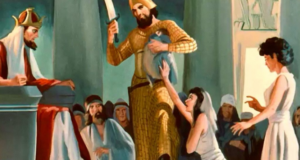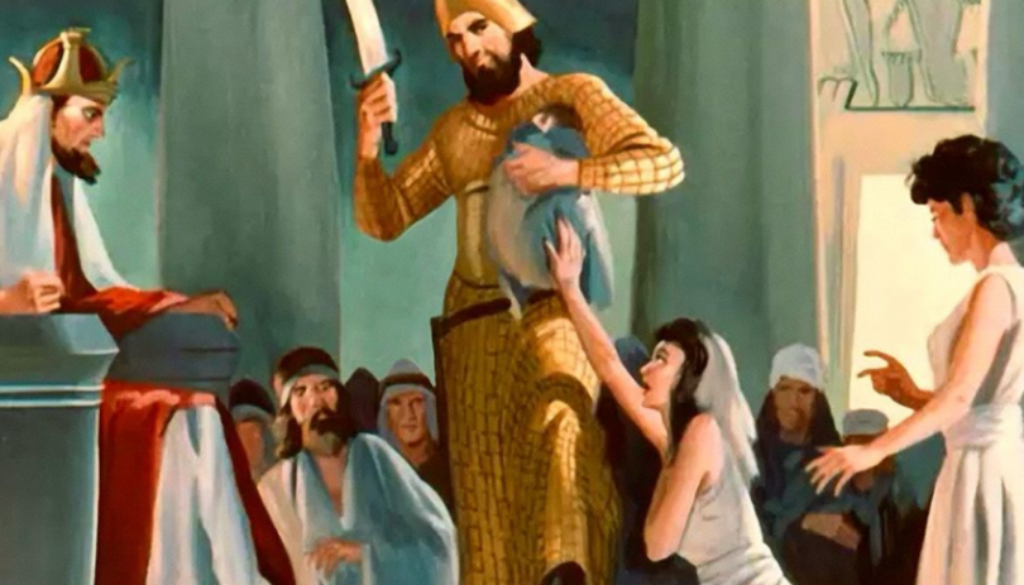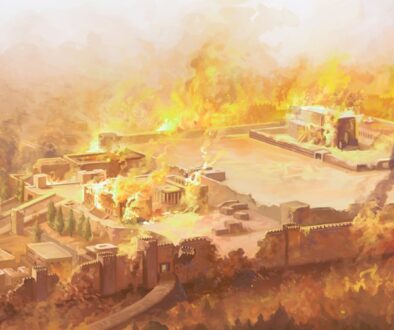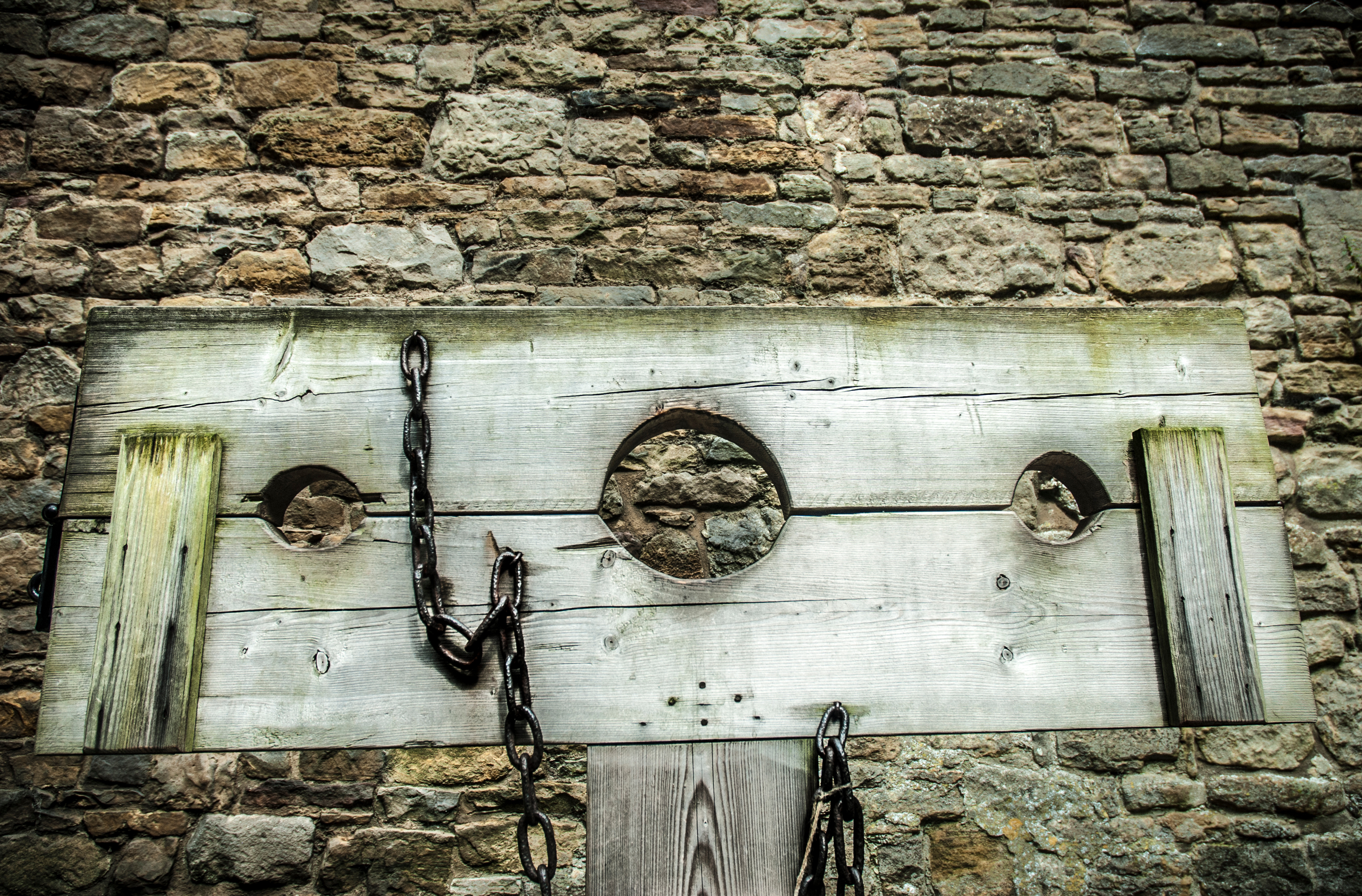1 Kings 3 A Wise Mind

Solomon desires to walk in the ways of the Lord. God offers him a single request and Solomon chooses a wise mind above all else.
Solomon is a young king. He is not THE youngest king to ever rule, but he has had no experience in leading a nation. David is gone, and Solomon has to go on without him. Because he honors the Lord, God gives him an offer of one request to be granted. NO. Not like a genie in a bottle, but a Lord who loves His child and wants to grant him the deepest desire of his heart.
Because Solomon has been taught from a young age to value wisdom above all else, the choice is easy for him. He needs help running the nation and he wants to do it right. Solomon asks for the one gift that can help him do this; a wise and discerning mind. It will not prevent him from making any mistakes, but it is used to rule the people of God with wisdom. Let’s join Solomon as he continues on his journey to be the king that the world will never forget.
♥ ♦ ♥
Solomon is still feeling his way along when it comes to being king of Israel. He feels inadequate to the task, but know that if he were to say this to the people, he would put them into a state of fear. He doesn’t have the years of training, starting with ground zero in leadership, behind him as he steps into this role. But he is where he is by the hand of God. “I will not stop trying just because I fear failing” Solomon resolves to himself.
One of the things Solomon is concerned about is the nations around him. Israel grew under his abba’s reign. It grew through warfare. Solomon is not a man of war, but of peace. So, to protect Israel, Solomon seeks alliances. One path to alliances is marriage. Solomon’s first ‘path to peace’ alliance is with Egypt. Solomon takes as his wife, Pharaoh’s daughter to seal the agreement of peace.
“I’m sorry I don’t have an elaborate palace to offer you as your home, but I have the home my abba lived in from before I was born. I offer it to you as our home, for now. I have plans for a grander home of our own” Solomon tells Pharaoh’s daughter as he brings her into the City of David.
Pharaoh’s daughter smiles and graciously accompanies Solomon on a tour of her new home. She is satisfied with her accommodations, for now. “This will be fine, for now” she tells Solomon as her things are brought to her new chambers.
Having settled his new wife, Solomon goes on about the business of ruling the nation of Israel. One thing he makes certain to do on a regular basis is bring offerings and sacrifices to the Lord. There isn’t one centralized place for all of Israel to come to, so Solomon offers his sacrifices on the various high places that others have established. One of the MOST HOLY of those ‘high places’ is the Tabernacle at Gibeon.
The separation of the ark of the Lord and the Tabernacle structure has allowed Israel to justify creating multiple places of worship over the years. But the Tabernacle and the Tent of David are still revered as true places of worship and sacrifices are offered in both places daily.
Solomon is seeking a greater connection with the Lord when he comes to Gibeon. He decides to stay here overnight, so that he can spend an extended time with the God of his abba.
God has seen Solomon’s heart. He knows his deepest desires, and He is about to touch that very spot within him. As Solomon sleeps, the Lord speaks to him. “Ask what I shall give you” (1 Kings 3:5b).
Even while in a dream, Solomon KNOWS what to ask the Lord for. The very thing his heart has been aching for; God’s wisdom.
“You have shown great and steadfast love to your servant David my father, because he walked before you in faithfulness, in righteousness, and in uprightness of heart toward you. And you have kept for him this great and steadfast love and have given him a son to sit on his throne this day. And now, O Lord my God, you have made your servant king in place of David my father, although I am but a little child. I do not know how to go out or come in. And your servant is in the midst of your people whom you have chosen, a great people, too many to be numbered or counted for multitude. Give your servant therefore an understanding mind to govern your people, that I may discern between good and evil, for who is able to govern this your great people?” (1 Kings 3:6-9).
God is VERY pleased with Solomon’s choice. He knew what Solomon would choose before he even offered him a gift, but seeing Solomon do make that choice is priceless! “He did it” God says to Himself. Then He answers Solomon regarding his choice.
“Because you have asked this, and have not asked for yourself long life or riches or the life of your enemies, but have asked for yourself understanding to discern what is right, behold, I now do according to your word. Behold, I give you a wise and discerning mind, so that none like you has been before you and none like you shall arise after you. I give you also what you have not asked, both riches and honor, so that no other king shall compare with you, all your days. And if you will walk in my ways, keeping my statutes and my commandments, as your father David walked, then I will lengthen your days” (1 Kings 3:11-14).
Solomon’s heart swells inside his chest with joy! God has heard his heart. Then Solomon wakes up. He is awed by this dream and he KNOWS it is from the Lord, but he doesn’t ‘feel’ any different. He does NOT doubt God’s hand though. He only wonders how long it will be before he sees God’s gift in action.
“I will offer an even greater sacrifice to the Lord at the Tent my abba made for the Lord. There is where the presence of the Lord dwells. And He is WORTHY to be praised!”
Solomon returns to Jerusalem and completes the vow he made after waking from his dream. He goes the Tent where the Ark of the Covenant rests. Through the hand of the Levites serving there, he offers burnt offerings and peace offerings. He offered so many animals that all of his servants joined him in feasting on the portion given back to man. This was a day of great celebration.
Solomon didn’t have long to wait before seeing God’s wisdom in action.
Today starts like any other day in Israel, until a scream rises into the streets. It is that of a mother who has lost her child.
Liza and Alta are fellow prostitutes. Both became pregnant during their time of service, and both were moved to the birthing house for their profession. No one wants to see a pregnant prostitute, nor her illegitimate child. They are shut away with all the others whom society deems undesirable. Liza and Alta share a room in this home. They are currently the only residents of this particular house.
In the middle of the night, Alta accidentally rolled over onto her child and smothered him with her breast. She wakes up to the discomfort of over full breasts and discovers the state of her child. She doesn’t consider herself a bad person or an unfit mother. ‘Accidents happen.’ But she wants a child. Alta carefully gets up and slips Liza’s child from beside her, and places her dead child in its place. “She won’t even notice. All babies look alike.” Alta goes back to her bed and nurses Liza’s child and lays back down to sleep the rest of the night.
Morning breaks and the fullness of Liza’s breasts wake her to her child’s need to nurse. Liza touches the face of her child and finds no warmth in it. She shakes him gently but he doesn’t respond. She knows in her heart that he is dead. A mournful wail breaks past her lips as she clutches the lifeless child to her.
As the room begins to receive the light of the new day, Liza looks at the child she now holds and realizes that something is not right. This is not her child! She knows every feature of her child as she has traced his nose with her finger, and wiped his small curls from his forehead.
“This is not my child!” she shouts as she walks over to her roommate. She looks down at the child Alta is nursing and cries out again. “You have my child! This one is yours. Give me my baby!”
Alta draws away from Liza and pushes her back with her free hand. “This is my child. Yours is the one you are holding. The dead one!”
They struggle and argue back and forth. Their voices ring out into the streets and one of the guards who patrol the city hears them. He begins to pound on the door as the raised voices and cries of the one living child continue to rise.
“Open in the name of the king”, he shouts.
Alta moves past Liza and opens the door. She tries to flee with the child but is stopped by the guard.
“What is the meaning of this”, he shouts.
Both women begin talking at once. “She gave me her dead child…” “She is trying to take my child…”
“Enough!” demands the guard. “We are taking this to the king for his decision.” Both women walk with the guard, as they have no other choice.
Solomon is on his throne rendering judgments as people bring their disputes to him. He hears a commotion in the hallway as the guard pushes in front of those waiting to hear from the king. The guard stops with the two women and the two infants at the threshold.
Solomon’s eyes are drawn to the infant who lies obviously lifeless in one woman’s arms. The little head is extended beyond the mother’s arm and hangs lifelessly from its body. It takes all his will to refocus his attention of the matter currently before him. It is a dispute over water rights.
“You cannot keep your neighbor from access to the streams that flow through the valley. And you cannot erect structures on your neighbor’s land or dig trenches to get to the water. Share it by allowing your neighbor reasonable access or I will eject both of you from the land and give it to those who know how to be good neighbors” commands Solomon.
Both men bow and make their way out of the throne room. Solomon motions the guard and the two women forward.
“What is the trouble here” Solomon asks the guard.
“These two women were having a very heated argument that I was afraid would turn violent. So I brought them to you for your judgment, my king.”
“What is the basis for your disagreement?”
Both women begin talking at once again before Solomon holds up his hand. He points to Liza who is holding the dead child. “You. Tell me the story.”
“Oh, my lord, this woman and I live in the same house, and I gave birth to a child while she was in the house. Then on the third day after I gave birth, this woman also gave birth. And we were alone. There was no one else with us in the house; only we two were in the house. And this woman’s son died in the night, because she lay on him. And she arose at midnight and took my son from beside me, while your servant slept, and laid him at her breast, and laid her dead son at my breast. When I rose in the morning to nurse my child, behold, he was dead. But when I looked at him closely in the morning, behold, he was not the child that I had borne” (1 Kings 3:17-21).
The Alta calls out; “No, the living child is mine, and the dead child is yours” (1 Kings 3:22a), as she turns away with the child.
The Liza tries to push the dead child into Alta’s arms and retrieve her own son. While doing so she calls out; “No, the dead child is yours, and the living child is mine” (1 Kings 3:22b).
They argued like this, back and forth, until Solomon called for silence. Both women stand glaring at one another. This matter is far from settled.
“The one says, ‘This is my son that is alive, and your son is dead’; and the other says, ‘No; but your son is dead, and my son is the living one’” (1 Kings 3:23), Solomon says while looking at the two women. He looks up at a guard standing by the door. “Bring me a sword” (1 Kings 3:24), Solomon commands.
All eyes are on the guard as he comes forward with the sword and presents it to Solomon. Solomon points to the two women and says; “Divide the living child in two, and give half to the one and half to the other” (1 Kings 3:25).
Gasps are heard around the room as the living child is taken from Alta’s arms and the guard prepares to ‘divide the child in half’.
Liza drops to her knees and holds her hand out in a desperate plea. “Oh, my lord, give her the living child, and by no means put him to death” (1 Kings 3:26a). Liza’s heart is breaking for her child. She would rather surrender him to another woman than to death.
Alta believes it ‘poetic justice that they will both lose their children this day by the command of the king. “He shall be neither mine nor yours; divide him” (1 Kings 3:26b).
Solomon knows instantly who the true mother is. Only a mother could love her child more than herself. “Give the living child to the first woman, and by no means put him to death; she is his mother” (1 Kings 3:27).
Liza springs up from the floor and moves to retrieve her son from the hands of the guard. At that moment she realizes that she is still holding Alta’s lifeless child. She pushes him into Alta’s breast and forces her to accept him. Then she turns and retrieves her child from the hands of the guard. Tears of joy cascade down Liza’s face, replacing those of anguish she had previously been shedding.
The guard escorts both women from the throne room. Before they even clear the steps leading to the palace, their story is making itself known among the people. Those waiting in line to see the king are most impressed by his wisdom and trust him implicitly to judge their cases fairly. Those in line attempting to bring fraudulent charges immediately drop their cases. If the king could see the truth in this situation, their pretense held no possibility of prevailing.
Alta is left to bury her child while Liza returns to their home with her son. As Alta no longer has a child, she will be free to go back into service, once her milk dries up. She will no longer be sharing a room with Liza.
After the final case is heard for the day, Solomon goes into his chambers and drops to his knees. “Lord God of Abraham, of Isaac, and Jacob, and my father. Thank You for proving Yourself faithful in helping me render wise judgments for Your people. I would have been lost this day without You and Your prompting in my spirit. I believed myself ‘mad’ as well, when calling for the sword. Only Your confidence and surety held me firm in my actions. And the truth came shining through! Only You could have authored that result.”
Solomon will remember this day for the rest of his life. The day that he saw the hand of the Lord deliver wisdom through his own hand. He would make it a point to search his soul each time before rendering judgment. He would search to hear the voice of the Lord.
(to be continued)
Oh how I wish for the wisdom of Solomon and that it was at work in our world today! I TRULY wish our leaders would seek out the source of Solomon’s wisdom and exercise it with integrity.
Even with all his wisdom, Solomon was not perfect. He had a weakness for women. I have a feeling that he inherited that from his father. But Solomon would allow his wives to eventually lead him to worship other gods. David NEVER wavered in worshiping the Lord God of all creation. Therefore, making the point that “knowing right and wrong” does NOT equal “doing right” in the face of opposition.
Father God, I pray for my country right now. Give those who are our leaders YOUR wisdom and have them adhere to it. I see SO MANY gaping pits waiting for us to fall into. If this is part of what is required before Jesus returns to take the church away, so be it. But if not, Lord heal our nation.
I pray for all the other nations in the world. I know that, one day, Jesus will rule them all. Until that day comes, I pray for Your protection on all that call upon Your name, no matter where they live. Put Your hedge of protection about them and guard them from evil. Guard me and my heart as well Father God.




